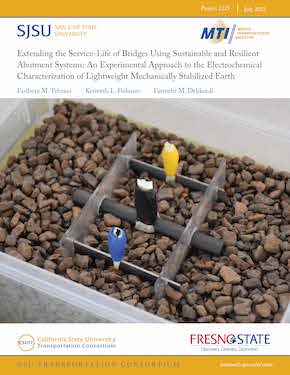- 408-924-7560
- mineta-institute@sjsu.edu
- Donate
Extending the Service-Life of Bridges using Sustainable and Resilient Abutment Systems: An Experimental Approach to Electrochemical Characterization of Lightweight Mechanically Stabilized Earth
Bridges are critical components of transportation infrastructure. This research addresses the need to extend the service life of bridges by improving the safety and reliability of bridge abutments and reducing their life-cycle cost and footprints. Mechanically stabilized earth (MSE) is a known strategy to enhance the economy and performance of bridge abutments. In addition, the application of rotary-kiln-manufactured lightweight aggregate backfills improves the performance of MSE bridge abutments with a leaner structural system. Such improvements include a reduction of structural demands due to a lower density, free drainage of granular materials, a high internal friction angle, less settlement with no consolidation, and accelerated construction requiring less compaction effort. This project aims to assess the electrochemical properties of expanded shale, clay, and slate (ESCS) aggregates and their influence on the corrosion of embedded steel strips. The experimental methodology involves evaluating current testing methods to measure electrical resistivity, pH, sulfate, chloride, and corrosion considering various gradation, moisture, dilution, and curing conditions. Samples represent available sources of ESCS with one source of normal weight aggregates for comparison. Results indicate the appropriateness of ESCS for addressing corrosion in MSE backfills. Further, outcomes provide guidelines to categorically predict the corrosivity of steel reinforcement when ESCS is employed as fill within MSE systems. These guidelines can help optimize the design and reduce the need to maintain and rehabilitate bridges, abutments, and approach and departure slabs on roadways to keep transportation systems safe and cost-efficient for sustainable infrastructure.
FARIBORZ M TEHRANI, PHD, PE, ENV SP, PMP, SAP, F.ASCE
Dr. Fariborz M. Tehrani is a Professor and Director with more than three decades of academic and industry background in engineering design, management, education, and leadership. His research and practice experiences focus on sustainable and resilient structural engineering, mechanics, and materials (SR-SEMM). Fariborz is a Fellow ASCE, the Director of the ESCSI, a voting member of several ACI, ASTM, and TRB Committees, the EMI’s Liaison in the ASCE Sustainability Task Committee, and the Vice Chair of EMI Objective Resilience Committee. He has also served as the ISI Academic Committee Chair and EWB professional mentor in USC, UCSD, and Cal Poly SLO. He has over 100 published and over 110 presented scholarly works. Dr. Tehrani received the 2015 ASCE Region 9 Outstanding Faculty Advisor Award, the 2017 CHESC Best Practice Award, and two 2019 ASCE Research Awards from Fresno and San Francisco for two projects. He received his BSc from the Sharif University of Technology, his MSc from Amirkabir University of Technology, and his MS, Degree in Engineering, and PhD from the University of California, Los Angeles.
KENNETH L FISHMAN, PHD, PE, M.ASCE
Dr. Kenneth L. Fishman, PhD, PE is a geotechnical engineer and principal at McMahon and Mann Consulting Engineering and Geology, P.C. where he leads the Earth Reinforcement Testing Division. For the past 25 years, he has been involved in the research and application of corrosion testing and corrosion mitigation for buried steel. He has served on numerous projects related to condition assessment, corrosion monitoring, and expected service life modeling for earth reinforcements. These projects include research, the implementation of research results, training, and applications of state-of-the-art techniques for performance monitoring and the characterization of corrosion potential. They have involved different transportation agencies, suppliers of earth reinforcement systems, dam owners, mine operators, railway operators, contractors, and engineering consultants scattered throughout North America. Dr. Fishman served as PI for NCHRP Project 21-11 “Improved Test Methods and Practices for Characterizing Steel Corrosion Potential of Earthen Materials,” and was appointed to the National Academy of Science Engineering and Medicine (NASEM) ad hoc Committee on "The Corrosion of Buried Steel at New and In Service Infrastructure.” He has participated in numerous workshops and webinars sponsored by NCHRP, FHWA, AASHTO, TRB, and others including two webinars related to asset management and performance modeling sponsored by the FHWA Office of Asset Management and Resource Center, AASHTO, and TRB. Dr. Fishman has extensive experience reviewing technical documents having served as an editor for the ASCE Journal of Geotechnical and Geoenvironmental Engineering, and current assignments as an editor for Geostrata, and member of the ASCE Geo-Institute (GI) Technical Publications Committee with responsibilities including editing for the ASCE series on Geotechnical Practice Publications (GPP).
FARMEHR M DEHKORDI, MSC, M.RILEM
Mr. Farmehr M. Dehkordi is a Rilem member and Ph.D. student in Civil and Environmental Engineering at Politecnico di Torino and a visiting research assistant at California State University, Fresno. His research interests include the application of fiber-reinforced brittle materials, such as fiber-reinforced concrete (FRC) and fiber-reinforced ice (FRI). He received his BSc from Isfahan University of Technology and his MSc from Politecnico di Torino.
-
Contact Us
San José State University One Washington Square, San Jose, CA 95192 Phone: 408-924-7560 Email: mineta-institute@sjsu.edu






